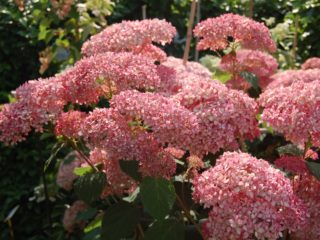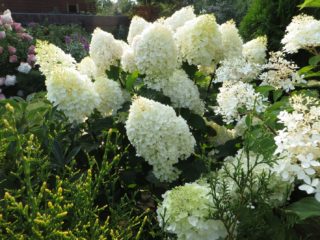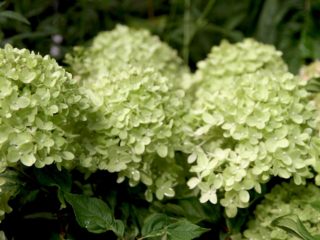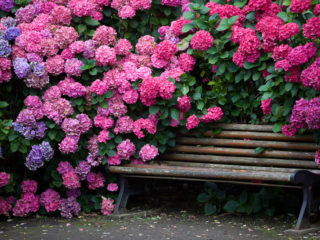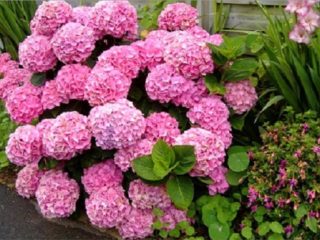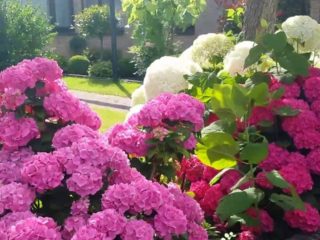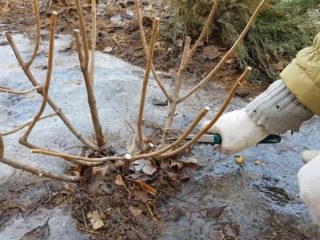Content
Hydrangea Bella Anna is a member of the Hydrangeaceae family. It has become known to Russian gardeners since 2012. The variety was bred in Eastern countries, then gradually spread throughout the world.
Description of Bella Anna hydrangea
This variety has a tree-like form. The height of an adult plant does not exceed 140 cm, and the crown diameter is 130-150 cm.
The shrub has straight and strong green-brown branches. During the flowering period, the shoots bend slightly under the weight of the inflorescences.
The flowers are large, from 15 to 20 cm in diameter, inflorescences of crimson color. They are formed only on young shoots. The flowers are small, but regularly shaped: each of them consists of 5 rounded petals with slightly pointed ends.
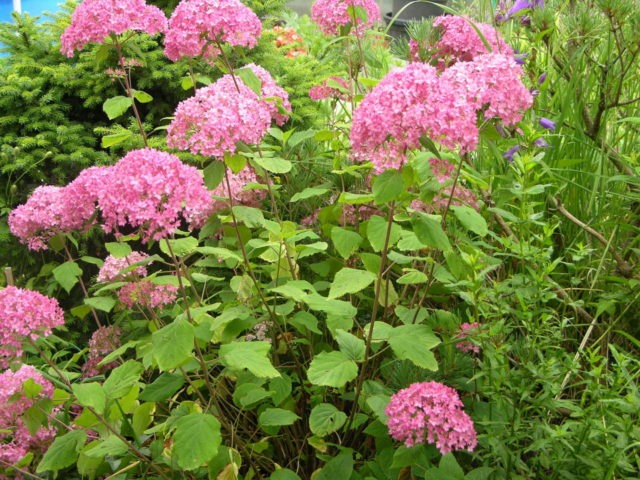
The decorative effect of hydrangea is maintained throughout the entire flowering period; as the petals fade in the sun, they change shade from crimson to soft pink
The leaf blades of the variety are light green in color, rounded-ovate in shape. When viewed, you can see veins. As the daylight hours decrease, the color of the leaves changes to yellow. The roots of Bella Anna hydrangea are located close to the surface.
The advantages of the variety include its attractive appearance and the ability to change the shade of flowers in different soils. Among the disadvantages of Bella Anna hydrangea are the need to select soil and the plant’s love for watering.
Hydrangea Bella Anna in landscape design
Since the shrub is not tall, it is rarely used as a hedge. More often they prefer to plant it on the lawn or near gazebos in order to create mixed compositions.
Hydrangea pink Bella Anna, although it loves the sun's rays, grows well in partial shade. If you create diffuse lighting for it, this will be the optimal condition. Landscape designers use this feature when placing shrubs close to fences or houses.
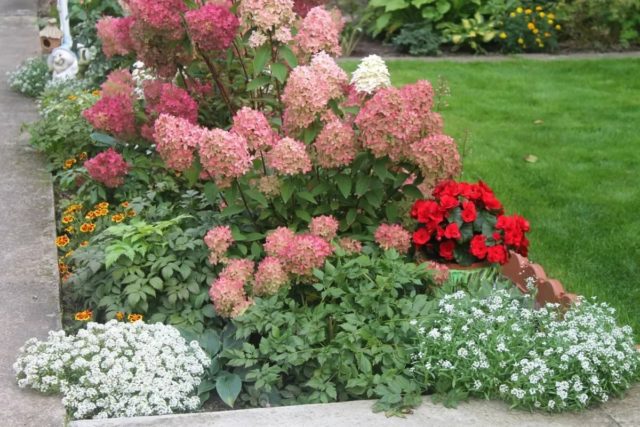
More modest crops will be good neighbors for hydrangea: Echinops, aconite or perennial hosta
Winter hardiness of hydrangea Bella Anna
Hydrangea can be grown in regions where in winter the air temperature does not drop below - 34 °C. If there is a risk of abnormal cold, then it is advisable to cover the bush with improvised means.
Planting and caring for Bella Anna hydrangea
To obtain large and long-flowering plants, you must adhere to the rules of planting and caring for the variety. Hydrangea Bella Anna blooms 2-3 years after the seedling is transferred to open ground. Depending on the composition of the soil and care, inflorescences may appear on young shoots the following year after planting. The optimal time for the procedure is spring: when the snow melts, the soil warms up and spring frosts stop.
Selection and preparation of a landing site
The place should be well lit or in partial shade. Bella Anna hydrangeas should not be placed under trees as they will compete with each other for moisture.
The variety is demanding on soil composition: it tolerates alkaline soils very poorly. Large inflorescences can be seen if you plant Bella Anna hydrangea in an area with an acidic substrate (pH no more than 6).
If the soil on the site does not meet the requirements, then the plant will either not take root, or its inflorescences will be small, quickly fade, and have a dull color.
To determine acidity, you should purchase a litmus indicator from a flower shop.

If the test revealed that the acidity does not meet the requirements, this can be changed using available means
To increase the pH, it is recommended to use a solution of manganese or citric acid. To do this, dissolve 1 g of the product in 1 liter of water. Alternatively, a substrate from coniferous plantations can be used as an oxidizing agent.
The soil for planting should contain soil, compost, peat and sand in a ratio of 2:2:1:1. Mineral and organic fertilizers should be added to depleted soil.
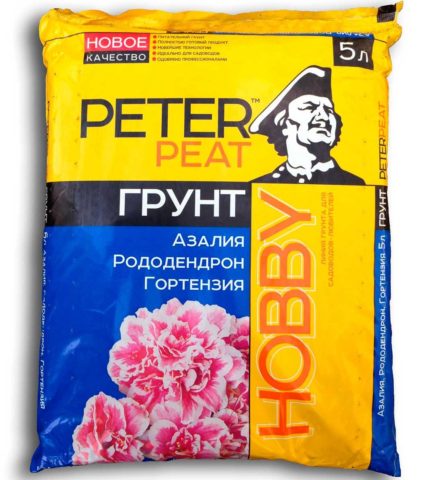
If it is impossible to prepare the site yourself, you can use ready-made soil from a flower shop
Landing rules
If you plan to place more than one shrub on the site, then planting holes should be dug while maintaining a distance of 1 m. If the seedling is small, then the dimensions of the hole should be 40x40x40cm. When the plant is large, the hole should be widened so that the root system is fully expanded when planting.
Fill the hole with soil, then thoroughly water and mulch. This will allow the soil to remain moist and the shrub to take root faster.
If the seedling has a closed root system, then there are no special requirements for planting: you can move it throughout the summer season.
When the roots of the Alla Bella hydrangea are exposed, the shrub should be transferred to open ground immediately after purchase. If this is not possible, then the root system of the plant is wrapped in a damp cloth or placed in a plastic bag.
During planting, you should carefully remove the seedling from the container and, without damaging the roots, place it in a hole, cover it with soil on top and compact it lightly, then water the seedling thoroughly.
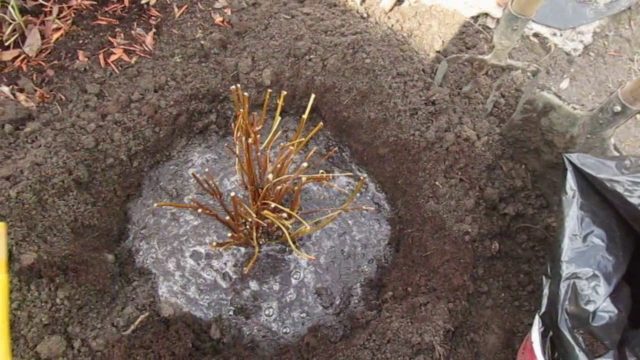
You should not skimp on watering: hydrangea is very demanding of moisture, so 1-2 buckets should be poured under each seedling
Watering and fertilizing
When caring for hydrangea, do not allow the soil to dry out. During dry months, it is recommended to increase the frequency of watering. After moistening the soil, it should be mulched.
In the spring, when shoots are actively growing, and in the summer during flowering, it is important to provide the Bella Anna hydrangea with fertilizers of mineral and organic origin. To do this, it is recommended to use complex means. During the growing season, 20 g of fertilizer is dissolved in 10 liters of water for feeding. At least 3 buckets of solution should be poured under each bush.
In summer or autumn, it is recommended to irrigate Bella Anna hydrangea with Lauren complex, diluting 10 ml of the drug in 1 liter of water.
Pruning Bella Anna hydrangea
The recommended time for the procedure is spring, although gardeners carry it out in the autumn. The purpose of pruning is to remove weak and damaged shoots. The oldest branches are cut down to the base.
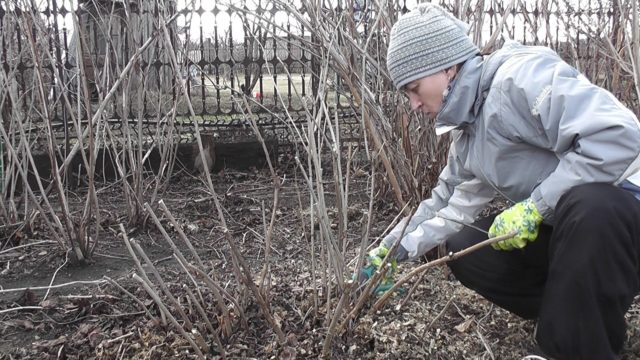
If you cut the bush short, then next year the flowers will be large and few in number, and if you remove only the tops, the plant will delight you with small inflorescences
Preparing for winter
In September, watering should be stopped completely. The older the plant, the more frost-resistant it is, so adult shrubs do not need shelter. Young specimens need protection from wind and low temperatures for 2-3 years after planting: they are hidden under spruce branches or covering material. The tree trunk circle should be covered with mulch and later with snow.
Reproduction
The most common way to obtain several Bella Anna hydrangea shrubs is from cuttings. The process is carried out in mid-July. To do this, the side shoots are cut off and planted in a nutrient mixture consisting of peat and sand in a 2:1 ratio.
To speed up the process, before planting, the cuttings are treated with the growth stimulator Zircon or sprinkled with Kornevin. A new root system is formed in the plant 3 weeks after planting.

The cuttings in the container must be placed at a slight slope, making sure that the soil is moist
Mature shrubs are propagated by division: they are dug up and divided into two equal parts. In order for the Bella Anna hydrangea to take root, it is necessary to preserve at least 3 buds on it.
The most labor-intensive method of propagation is by seed. The seed is placed in a weak acidic substrate and the soil is sprayed with water from a spray bottle until the first shoots appear. Typically this period is 30 days.
Diseases and pests
Hydrangea Bella Anna has good immunity, but can get sick if it grows near water bodies due to disruption of the drainage system.
Excessive soil moisture is one of the reasons for the appearance of gray rot. As a therapeutic measure, hydrangea should be irrigated with Fundazol solution, after cutting out the affected branches. Treatment with the drug is carried out twice with an interval of 2 days.
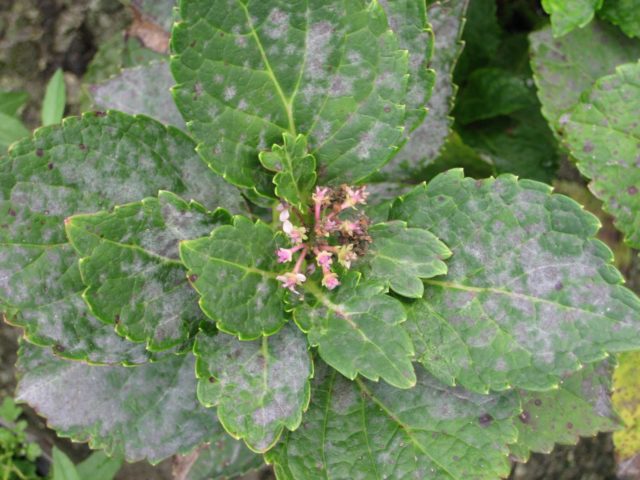
To prevent the development of gray mold, it is important to control the operation of the drainage system and avoid waterlogging of the soil
Common pests for Bella Anna hydrangeas are snails. They destroy young leaf blades and buds.
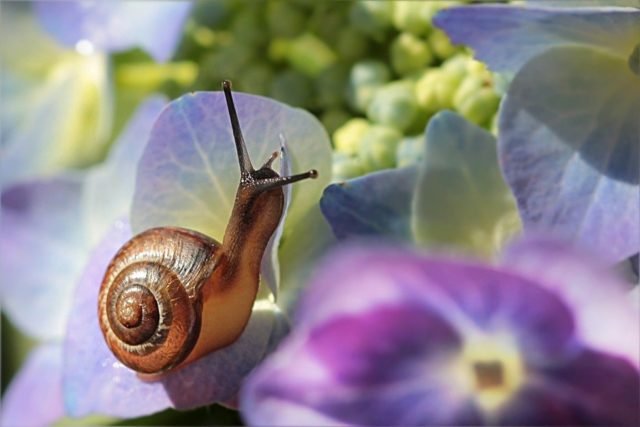
To destroy snails, you should scatter the drug Groza around the bush
To neutralize spider mites, whose activity leads to drying of the leaf blade, it is recommended to use Fitoverm. The product also fights aphids and thrips.
Conclusion
Hydrangea Bella Anna is one of the tree-like varieties of the Hydrangeaceae family.The plant is frost-resistant, moisture-loving, and has good immunity. The main purpose of the flower is to decorate the garden plot.
Reviews of hydrangea Bella Anna
